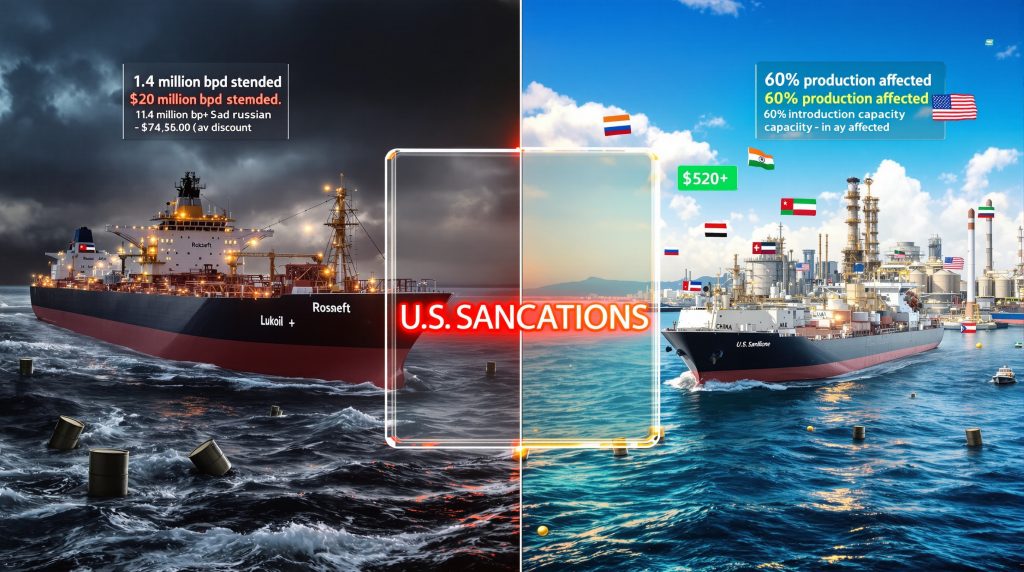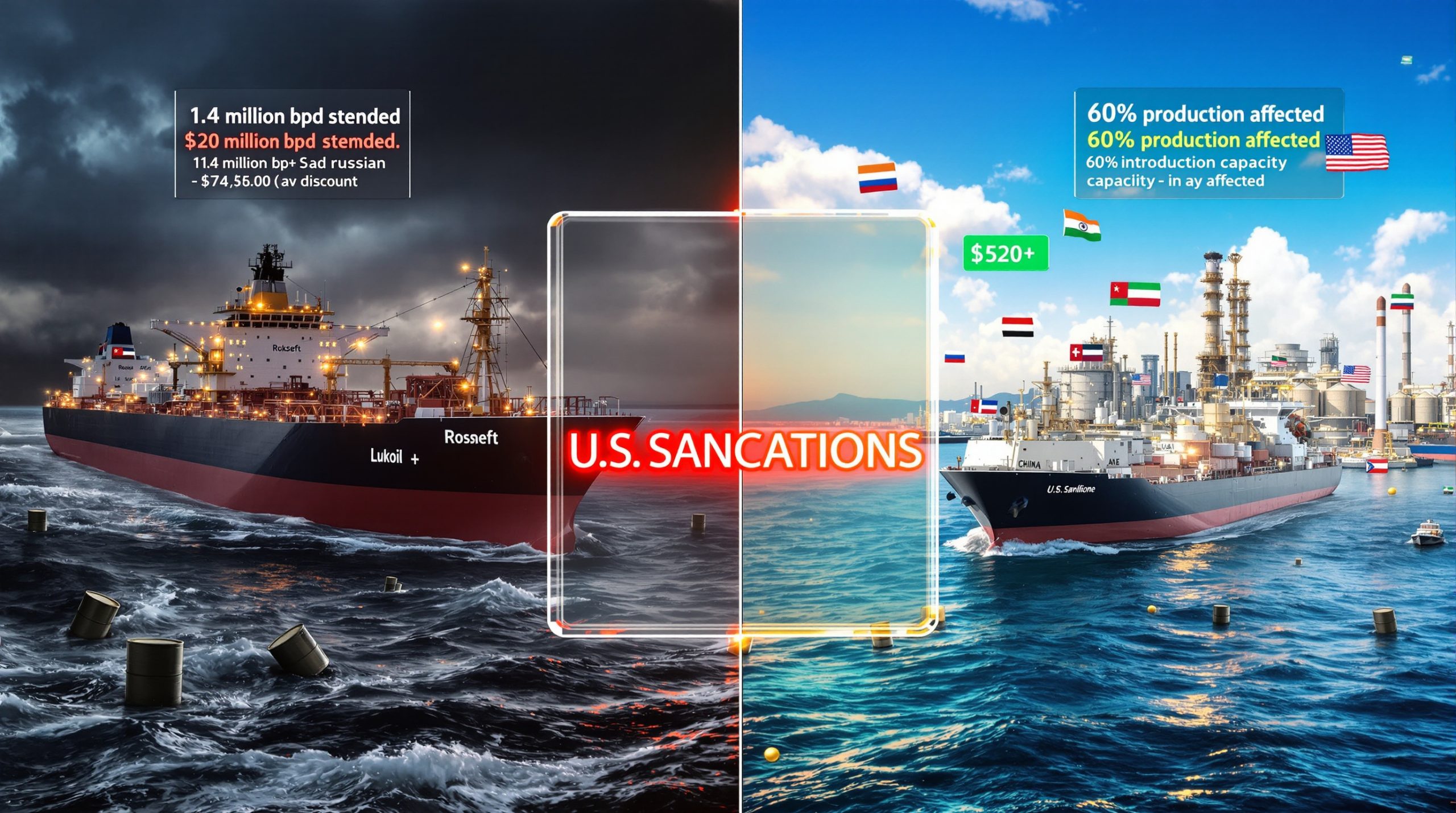Current Market Impact of Russian Oil Export Restrictions
The latest economic measures implemented by Washington targeting Moscow's petroleum sector have fundamentally disrupted international energy markets, creating supply chain complications that extend far beyond traditional geopolitical boundaries. U.S. sanctions on Russian crude exports represent a significant escalation in energy-focused economic warfare, affecting global crude pricing mechanisms and international trade relationships.
Unlike previous targeted sanctions that focused on specific individuals or limited transactions, the current framework directly impacts Russia's largest state-owned energy producers and their comprehensive export operations. This broad-scope approach has created unprecedented market disruptions, forcing international buyers to rapidly restructure their procurement strategies and supply chains.
Strategic Targets of the Sanctions Framework
The sanctions primarily focus on Russia's two largest petroleum companies, effectively severing their access to international markets and global financial systems. These restrictions target approximately 60% of Russia's total crude production capacity, according to recent industry analyses, making the market impact particularly severe.
Rosneft, Russia's largest state-controlled oil producer, faces comprehensive restrictions on international transactions and access to U.S. dollar-denominated payment systems. The company, which has historically maintained significant export relationships with Asian refiners, now operates under severe limitations that affect its entire trading network.
Lukoil, the country's major integrated oil company, confronts similar restrictions that impact both upstream production and downstream refining operations. The sanctions extend beyond the primary companies to include associated subsidiaries, trading entities, and transportation fleets, creating a comprehensive web of restrictions.
Recent developments show the immediate impact of these measures. According to U.S. sanctions have stranded a third of Russia's crude exports at sea, with vessels unable to complete deliveries due to payment restrictions and buyer reluctance.
Global Buyer Response and Market Adaptation
International purchasers have implemented immediate changes to their sourcing strategies, with major importing nations suspending or significantly reducing Russian crude purchases. The market response has been swift and decisive across multiple regions.
Asian Market Restructuring
China's Import Strategy Evolution
Chinese refiners have demonstrated varied responses to the sanctions environment. State-owned refineries have largely suspended new purchases from sanctioned Russian entities, prioritising compliance with international banking restrictions. Independent refiners, operating with different risk profiles, continue selective purchases but demand substantial price discounts to offset compliance costs and operational risks.
India's Supply Chain Pivot
Indian refiners have accelerated diversification efforts, seeking alternative suppliers from Middle Eastern producers and negotiating new long-term contracts with non-sanctioned entities. Major refiners including Indian Oil Corporation and Reliance Industries have publicly announced supply chain adjustments to ensure uninterrupted operations.
European Market Acceleration
European buyers, already reducing Russian imports since 2022, have further accelerated their transition toward Norwegian, North American, and Middle Eastern suppliers. This shift has created additional demand pressure on non-Russian crude grades, contributing to price premiums in certain market segments.
Furthermore, the trade war global impact continues to influence energy market dynamics, as geopolitical tensions reshape traditional trade relationships.
Transportation and Logistics Disruptions
Maritime logistics have become a critical bottleneck in Russian oil trade, with significant volumes currently stranded aboard tankers worldwide. Insurance companies and international shipping firms increasingly refuse to handle Russian crude cargoes, creating operational complications beyond direct sanctions.
The transportation disruptions extend beyond immediate delivery challenges. Ship-to-ship transfers in international waters have increased as traders attempt to obscure cargo origins, while extended payment terms through alternative banking systems create additional operational complexity.
Insurance and Shipping Challenges
Lloyd's of London insurers and international Protection & Indemnity (P&I) clubs have tightened policies regarding Russian crude shipments, requiring enhanced due diligence and compliance documentation. These requirements significantly increase transaction costs and operational complexity for remaining trade flows.
Price Impact and Market Distortions
The restrictions have created substantial pricing distortions, particularly affecting Russian crude benchmarks relative to international standards. Current market data shows Urals crude trading at discounts exceeding $20 per barrel to Brent crude, representing the widest discount spread observed in 2025.
Benchmark Price Effects
Brent Crude Response
International benchmark Brent crude has maintained price premiums due to supply concerns, though the impact remains moderate as global production from other sources continues. Current pricing shows Brent at $62.86 per barrel, reflecting market stability despite supply disruptions.
However, oil price movements demonstrate significant volatility as markets adjust to evolving supply constraints and geopolitical developments.
Regional Benchmark Variations
Different regional benchmarks show varied responses based on import dependencies and alternative supplier availability. Asian crude benchmarks demonstrate more significant volatility due to higher historical dependence on Russian supplies, while North American benchmarks remain relatively stable.
In addition, oil price crash analysis reveals how multiple factors beyond sanctions contribute to market instability, including OPEC production decisions and broader economic concerns.
Alternative Trading Mechanisms and Circumvention
Despite comprehensive restrictions, various mechanisms continue to facilitate reduced-volume Russian oil trade, though at substantially increased costs and operational complexity. These alternative approaches include sophisticated trading structures designed to minimise direct exposure to sanctioned entities.
Complex Trading Structures
Ship-to-ship transfers in international waters have become more common as traders attempt to blend Russian crude with non-sanctioned grades. These operations typically occur in locations beyond national jurisdiction, though they face increasing scrutiny from maritime authorities and satellite monitoring systems.
Extended payment terms through non-U.S. banking systems provide alternative settlement mechanisms, though these arrangements often require additional documentation and compliance procedures that increase transaction costs significantly.
Beneficiaries of Supply Disruptions
The reduction in Russian crude availability has created substantial opportunities for alternative oil-producing nations to expand market share and enhance pricing power in key importing regions.
Middle Eastern Producer Advantages
Saudi Arabia has increased exports to Asian refiners previously supplied by Russian producers, leveraging existing infrastructure and established trading relationships to capture market share. The kingdom's state oil company, Saudi Aramco, has reported increased demand from Chinese and Indian refiners.
United Arab Emirates has enhanced its position as a regional trading hub, with increased volumes flowing through Dubai and Abu Dhabi terminals. The UAE's strategic location and established trading infrastructure provide advantages in serving Asian markets.
Western Hemisphere Suppliers
United States LNG and crude exports have expanded significantly, benefiting from both European diversification away from Russian gas and increased Asian demand for alternative supplies. The us production trends show how domestic production patterns influence America's ability to fill global supply gaps.
Canada has increased heavy crude shipments to global markets, though pipeline capacity constraints limit expansion potential. Canadian producers benefit from price differentials created by Russian supply disruptions.
Enforcement Mechanisms and Effectiveness
The success of U.S. sanctions on Russian crude exports depends heavily on international cooperation and sophisticated monitoring capabilities to track complex global trading networks. Enforcement challenges include monitoring ship-to-ship transfers, tracking alternative payment flows, and coordinating with allied nations on consistent implementation.
Technology and Monitoring
Satellite imagery analysis and vessel tracking systems provide enhanced monitoring capabilities, though determined actors can still conduct transfers in remote ocean locations. The U.S. Treasury Department's Office of Foreign Assets Control (OFAC) continues developing enforcement tools and guidance documents.
International Coordination
Effective enforcement requires sustained coordination with European Union, United Kingdom, Canadian, and Japanese authorities to ensure consistent application of restrictions. Regular diplomatic consultations and information sharing enhance overall enforcement effectiveness.
Long-term Market Structure Changes
The current restrictions represent fundamental shifts in global energy trade relationships, potentially creating permanent changes to supply chain structures and international energy security policies. These changes extend beyond immediate supply disruptions to reshape strategic planning across the energy sector.
Supply Chain Diversification Acceleration
Energy importing nations have accelerated investments in supply diversification, reducing dependence on single-source suppliers and enhancing strategic petroleum reserve policies. This diversification requires substantial infrastructure investments and new long-term contracting relationships.
Financial System Evolution
Alternative payment mechanisms and reduced reliance on U.S. dollar-denominated transactions represent significant developments in international energy trade. Enhanced compliance monitoring systems and increased insurance costs for complex transactions become permanent features of global energy commerce.
Future Policy Evolution
Potential developments in the sanctions regime depend on geopolitical developments, policy effectiveness assessments, and their success in achieving stated objectives. Future scenarios include both escalation possibilities and potential de-escalation factors.
Escalation Scenarios
Potential expansions could target petroleum products exports, additional Russian energy companies, or enhanced secondary sanctions on international buyers. Coordination with allied nations on unified restrictions could amplify market impacts.
Moreover, tariff economic implications suggest that broader trade restrictions may complement energy-specific sanctions, creating compound effects on global commerce.
Stability Considerations
Global energy price concerns and economic impacts on allied nations may influence future policy decisions. Market stability considerations and diplomatic resolution possibilities could affect sanctions duration and scope.
Industry Monitoring Requirements
Energy market participants must track multiple indicators to navigate the evolving sanctions landscape effectively. Key monitoring areas include regulatory updates from the U.S. Treasury Department, shipping route modifications, alternative supplier capacity, and international coordination developments.
Critical Tracking Elements
- U.S. Treasury OFAC designation updates and enforcement actions
- Maritime insurance availability and shipping cost indices
- International Energy Agency supply and demand assessments
- Central bank statements on alternative payment systems
- Congressional Research Service analysis on sanctions policy evolution
The ongoing disruption of Russian oil exports through comprehensive U.S. sanctions represents one of the most significant energy market interventions in recent decades. These restrictions create implications extending beyond immediate supply and pricing effects to fundamentally reshape global energy trade relationships, supply chain security policies, and international financial system operations.
Market participants across all sectors must maintain vigilance in monitoring regulatory developments, supply chain adjustments, and pricing mechanisms as these unprecedented restrictions continue evolving. The long-term implications for global energy security and international trade relationships will likely persist well beyond the immediate sanctions period, creating permanent changes in how nations approach energy supply diversification and security planning.
Looking for Mining Investment Opportunities Amid Energy Market Volatility?
As global energy markets face unprecedented disruption from sanctions and supply chain restructuring, smart investors are turning their attention to the mineral exploration sector for diversified opportunities. Discovery Alert's proprietary Discovery IQ model provides instant notifications when significant ASX mineral discoveries are announced, helping subscribers identify actionable investment opportunities before the broader market reacts. Start your 30-day free trial today to gain immediate access to real-time discovery alerts and position yourself ahead of market movements.




